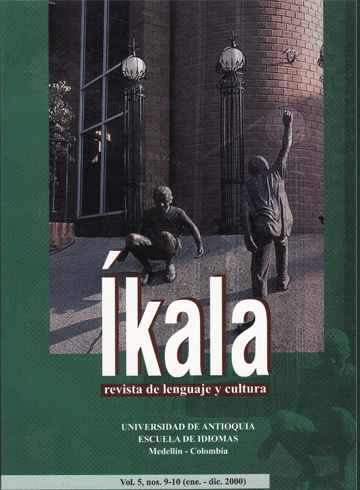La música como La lengua del amor y la Auto-Revelación de George Eliot "El molino en la seda."
DOI:
https://doi.org/10.17533/udea.ikala.8557Palabras clave:
literatura inglesa del siglo XIX, George Eliot, music.Resumen
En este articulo, la autora analiza la doble función que Eliot dio a la música en su novela. "The Mili on the Floss': lenguaje del amor, de la pasión y de la desesperanza, así como puerta hacia el mundo de la imaginación y del placer. Recordando las calidades musicales de Eliot, desvela cómo la escritora entreteje episodios de su novela con fragmentos de operas, cómo esos episodios están compuestos como los actos de una opera; eso convierte la novela en una exquisitez estética.
Descargas
Citas
AUBER, Daniel F. Masaniello: A Lyric Drama in Five Acts. London: T. Brettell, [18?]
________. Masaniello: Tragic Opera in Five Acts. Philadelphia: American Opera, 1870.
BELLINI, Vincenzo. La Somnambula. Libretto by Felice Romani. English translation by Peggie Cochrane. Synopsis by J. Wrey Mould. Conductor, Richard Bonynge. Germany: Deutsche Gramophon, 1963.
ELIOT, George. The Mill on the Floss. New York: Penguin Books, 1987.
GAY, Jhon. The Beggar’s Opera. In: Edgar V. Roberts ed. Lincon: University of Nebraska, 1969
HANDEL, George F. Acis and Galatea. Frankfurt: C.F Peters, [19?]
WHITER, George. What I care? In: Collected English Verses. Margaret and Donald Botrall ed. London: Sidgwick and Jackson, 1969
YOUNG, Percy M. George Eliot and Music. Music and Letters. No. 24: (1943), pp. 92-100
Descargas
Publicado
Cómo citar
Número
Sección
Licencia
Derechos de autor 2000 Íkala, Revista de Lenguaje y Cultura

Esta obra está bajo una licencia internacional Creative Commons Atribución-NoComercial-CompartirIgual 4.0.












